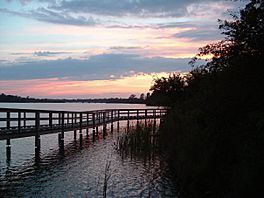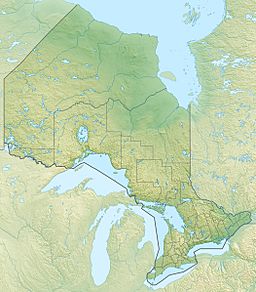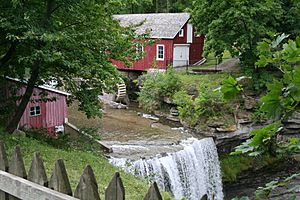Lake Gibson (Ontario) facts for kids
Quick facts for kids Lake Gibson |
|
|---|---|

The boardwalk at Mel Swart Lake Gibson Conservation Park
|
|
| Location | Regional Municipality of Niagara, Ontario |
| Coordinates | 43°06′06″N 79°13′40″W / 43.10167°N 79.22778°W |
| Type | Lake |
| Part of | Great Lakes Basin |
| Primary inflows | Welland Canal |
| Primary outflows | Twelve Mile Creek |
| Basin countries | Canada |
| Max. length | 5.0 kilometres (3.1 mi) |
| Max. width | 1.0 kilometre (0.6 mi) |
| Surface elevation | 170 metres (560 ft) |
Lake Gibson is a special lake located near Thorold in Ontario, Canada. It's not a natural lake, but was actually created by people! It was built to help make electricity using water power. This lake is also an important source of drinking water for the nearby city of St. Catharines.
How Lake Gibson Was Created
Lake Gibson was built to be a reservoir. A reservoir is like a giant storage tank for water. This water is used to create hydroelectric power. Hydroelectric power means making electricity from the force of moving water. The lake provides water for the Ontario Power Generation Decew Falls 1 and Decew Falls 2 power stations.
To make Lake Gibson, the shallow valley of Beaverdams Creek was flooded. This created the large lake we see today. Another smaller lake, Lake Moodie, is also part of this system. It is located to the northwest of Lake Gibson. Most of the water for these lakes comes from Lake Erie. It travels through the Welland Canal to reach Lake Gibson. The lakes are also connected to the Twelve Mile Creek watershed.
Important Landmarks Around the Lake
Highway 406 crosses right over Lake Gibson. This makes it easy to see the lake as you drive by.
At the western end of the lake, you can find Morningstar Mill. This is a historic site with a working gristmill. A gristmill grinds grain into flour. This mill has been operating since 1872. There is also a reconstructed sawmill nearby.
A short distance east of the mill are the ruins of DeCou House. This old house was the destination of Laura Secord's famous journey. She made a brave trip during the War of 1812 to warn British forces of an American attack.
Drinking Water and Lake Rules
Lake Gibson is a very important source of drinking water for the city of St. Catharines. Because of this, there are special rules to keep the water clean and safe. One of the main rules is that no boating is allowed on Lake Gibson. This helps protect the water quality for everyone who drinks it.
 | Emma Amos |
 | Edward Mitchell Bannister |
 | Larry D. Alexander |
 | Ernie Barnes |



